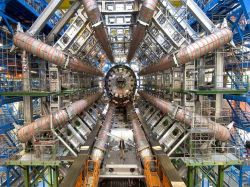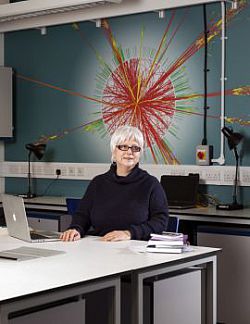International physicists on campus to explore next stage of LHC experiments
More than 150 physicists from all over the world will be at the University of Sussex on 13-15 April 2016 to attend a workshop on supersymmetry searches at the Large Hadron Collider (LHC) using the ATLAS detector.
 The ATLAS experiment at CERN's Large Hadron Collider in Geneva.
The ATLAS experiment at CERN's Large Hadron Collider in Geneva.
 Professor Antonella de Santo (Credit: Travis Hodges)
Professor Antonella de Santo (Credit: Travis Hodges)
The LHC is the largest and most powerful particle accelerator ever built, delivering head-on collisions of proton beams at energies never reached before. ATLAS and its counterpart CMS are the two multi-purpose detectors collecting data at the LHC.
After the momentous discovery of the Higgs boson by ATLAS and CMS in 2012, many pressing questions remain unanswered: what is dark matter made of? Are all known forces manifestations of one single unified interaction? Does the Higgs boson have any partners yet to be discovered? Supersymmetry is a theory beyond the well established Standard Model of particle physics, which predicts the existence of new high-mass particles that may be within the discovery reach of LHC experiments, and which may provide elegant solutions to some of these exciting puzzles.
The 2016 ATLAS SUSY Workshop represents a major milestone to define the strategy for supersymmetry searches at ATLAS at this crucial time for the experiment.
Dr Iacopo Vivarelli, Reader in Physics and Astronomy and one of the two international SUSY Conveners for ATLAS, said: “The LHC opened up a new, unexplored territory in particle physics. We don’t know whether we will observe new physics phenomena, but we need to be prepared for the new challenges. The workshop is a milestone in this sense: we look forward to hosting this major event on our campus."
Professor Antonella De Santo, who leads the ATLAS Team at Sussex and is Head of the Experimental Particle Physics group, said: "The search for supersymmetry is one of the hottest topics in the field of particle physics and at Sussex we are proud and excited to be at the forefront of it. It is a sign of recognition of the international standing of our group to have been asked to host such an important event at this crucial time. I look forward to many interesting and fruitful discussions with my ATLAS colleagues.”
